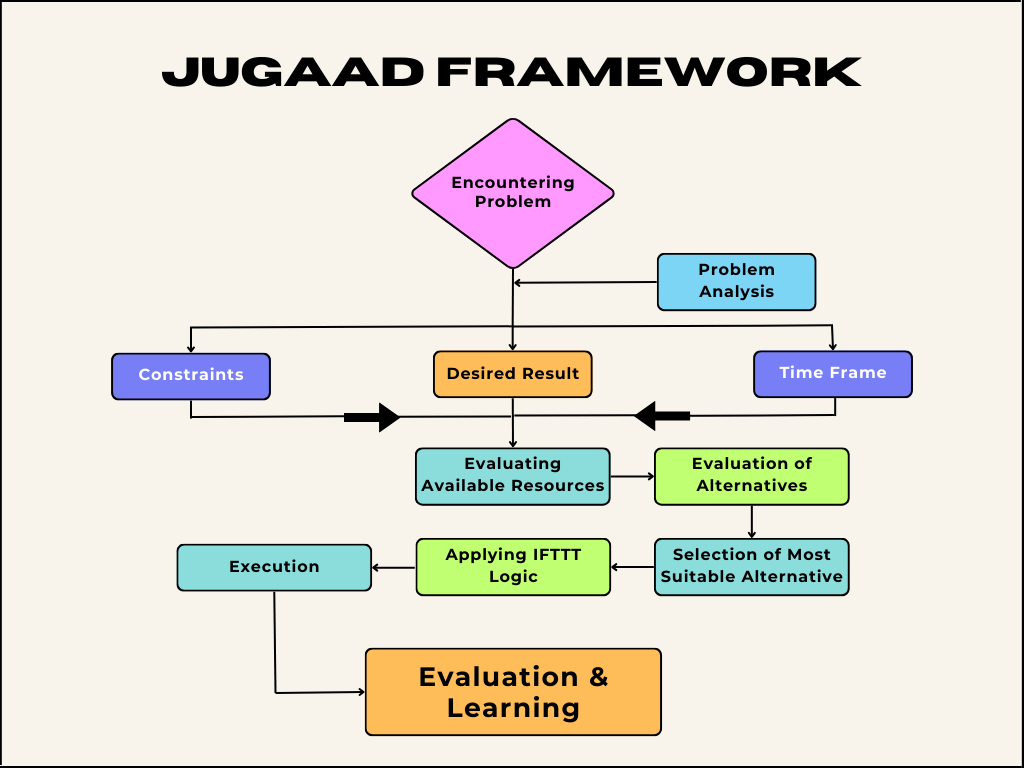What is Jugaad? Discover the Science Behind this Indian Way of Solving Problems

In the bustling streets and the vibrant culture of India, a unique concept known as ‘Jugaad’ is woven into the very fabric of daily life. Far from being just a colloquial term, Jugaad has emerged as a beacon of ingenuity and resourcefulness, especially highlighted by its critical role in saving lives during the Uttarakhand crisis.
Unfortunately, Jugaad has become a subject of ridicule due to our own lackadaisical approach towards domestic techniques. We read about the Assembly Line, Kanban, Pomodoro, Six Sigma, and many other approaches and embrace them with pride because that is how the West portrayed them. When it comes to our domestic, time tested approaches, we tend to push them under the carpet. If we do not recognize and promote domestic approaches, no one else will!
This article aims to decode the essence of Jugaad, an approach often misunderstood and underrated outside India, showcasing its potential as not just a makeshift solution but a legitimate, innovative strategy.
The Essence of Jugaad
Jugaad, often misunderstood in the West as merely taking shortcuts or crafting unscientific contraptions, is, in reality, a testament to the Indian spirit of resourcefulness. It is a multifaceted approach that embodies ingenuity, adaptability, and practicality, especially in situations with limited resources. It is an ancient problem solving approach driven by an IFTTT algorithm, programed into our personalities.
- Ingenuity and Adaptability: Jugaad is about crafting ingenious solutions, taking into account the context and immediate needs.
- Resource Optimization: It involves evaluating available resources, including time, and creatively utilizing them to solve problems.
- Experience-Based Solutions: Far from being random fixes, Jugaad solutions are often based on deep experience and learnings from the past.
- Alternative Problem-Solving: When mainstream resources are unavailable, Jugaad provides alternative means to achieve goals.
- Out-of-the-Box Thinking: It signifies creativity and quick thinking to arrive at effective solutions.
The Framework of Jugaad
The process of Jugaad is systematic and can be broken down into several stages:
- Problem Identification
- Breaking down the problem
- Evaluating available resources
- Considering and evaluating alternatives
- Selecting the most suitable alternative
- Using If This Then That (IFTTT) logic to further strengthen the planning
- Executing the plan and stay on course with IFTTT logic.
- Evaluating outcomes and deriving learnings

This structured approach not only provides immediate solutions but also opens avenues for refining and improving these solutions, potentially leading to more standardized and accepted practices.
Jugaad in Global Context
Jugaad’s potential extends beyond India. It’s increasingly being recognized worldwide as a management technique and a form of frugal engineering. Companies in Southeast Asia, for instance, are adopting Jugaad to reduce research and development costs. Its essence lies in maximizing resources creatively for both individuals and organizations.
Jugaad Beyond Engineering
While often associated with engineering, Jugaad’s scope is much broader. It applies to any creative, context-driven solution that achieves results despite constraints. Its most striking example was seen in the rescue of 41 tunnel workers in Uttarakhand, where traditional methods failed, and Jugaad prevailed.
The Future of Jugaad
Jugaad, with its systematic yet creative approach, holds the potential to be a mainstream practice. It can be systematically taught and applied in various fields, incorporating scientific, sustainable, and safety considerations. This approach aligns with globally recognized methodologies like Kanban, Pomodoro, and Six Sigma, underscoring the need to appreciate and integrate Jugaad into academic and professional realms.
In conclusion, ‘Decoding Jugaad’ is not just about understanding a concept; it’s about recognizing and appreciating a culturally ingrained problem-solving philosophy. Jugaad, with its deep roots in Indian culture, stands as a testament to human ingenuity and adaptability, offering lessons and inspiration far beyond its geographic origins.









